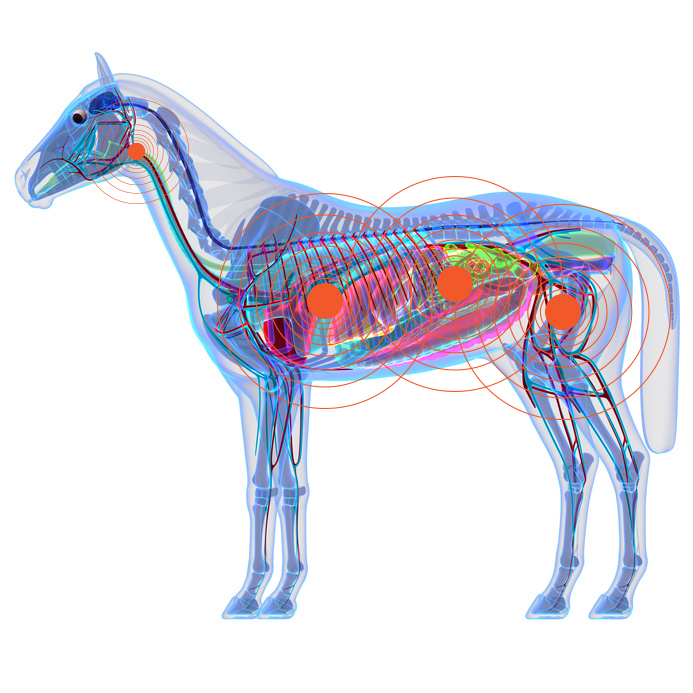Frequently Asked Questions About Probiotics for Horses
January 22, 2020

I’m here today to share the answers to some common questions we are asked on a regular basis about probiotics and their health benefits.
Probiotics are becoming very popular in the human health world. It's rare to turn on a cable tv program and not see an ad or program about their benefits.
However, there is a lot of mis-information floating around out there.
Horses, as you probably know, are all very unique. Because of this we get an amazing variety of questions regarding gut health issues and how to optimize the equine GI tract.
The questions and answers are applicable to many situations so I thought I’d share a few key points.
What is a probiotic? Is it a bacteria? Is it yogurt?
Probiotics are microorganisms that are believed to provide health benefits when consumed.
They can be bacteria or yeast - however, the scientific medical community agrees that yeast-based probiotics have more benefits and are better able to withstand harsh environments.
Yogurt does contain bacterial cultures but scientific evidence is unclear about whether it can make it past the harsh environment of the stomach acid and intestines.
Scientific studies show that we can modify the “flora” in our bodies by increasing the number of beneficial bacteria we consume.
How can probiotics help my horse’s digestive tract?
Probiotics help stabilize the equine digestive system and provide support for the horse’s natural gut microbiome (the biological "soup" that lives in your horse's belly 24/7).
Essentially we consider our probiotics to be the National Guard in your horse’s belly. They hold down the fort until the natural fighting troops can get on their feet.
We do not advocate loading the gut up with foreign microbes. Every body has a different mixture of beneficial bacteria that is unique to them, kind of like a thumbprint.
Our core probiotic, Saccharomyces boulardii (S. boulardii), is really good at this, which is why we call it the best probiotic for horses. It’s a yeast-based strain so it can be used during antibiotic treatment. And, it eventually leaves the body with no overgrowth effects.
Most of the scientific evidence available on probiotics is in regard to horse diarrhea control and this is why we originally created FullBucket – as a natural, healthy way to stabilize the equine digestive tract before it becomes an out-of-control system.
The vast benefits of probiotics are still being researched, but the list of claims is impressive.
Some of these beneficial claims of probiotics for horses include:
- Decreased pathogenic (bad) gastrointestinal bacteria;
- Reduced gastrointestinal discomfort;
- Strengthened immune system;
- Improved skin function;
- Improved bowel regularity;
- Increased resistance to cedar pollen allergens;
- Decreased number of pathogens in the body;
- Reduced flatulence and bloating;
- Increased DNA protection;
- Enhanced protection of proteins and lipids from oxidative damage; and
- Maintained individual intestinal microbiota in subjects receiving antibiotic treatment.
As the evidence becomes clearer regarding the different strains of probiotic and their positive influence on horse health, we will incorporate them.
What is a prebiotic and why should you include it?
Prebiotics are essentially “food” for the microbes. While S. boulardii is holding the enemies back, we bring in the prebiotics to feed the soldiers and help them get back on their feet and into the battle.
Do I need to use FullBucket probiotic everyday?
The honest answer is no.
We don’t believe in supplementing any animal just for the sake of supplementing. If your horse grazes freely 24/7 and is under zero herd, climatic or training stress, they most likely do not require an equine probiotic. However, most horses are under some form of stress on a daily basis.
If your horse is showing any sign of gastrointestinal discomfort or inconsistencies such as loose or diarrhea stool, then you may want to consider FullBucket probiotic on a regular basis.
If your horse is considered higher risk, such as a performance horse, you may want to try our Athletic Formula. Its purpose is to optimize the equine gut microbiome for overall health on a continuous basis.
If the problems still persist, you really should see a veterinarian.
How do I know if my horse needs a FullBucket probiotic?
Horses can’t tell you if they have a bellyache or other GI discomfort. However, you can know what to look for. Here are a few telltale signs of equine digestive problems:
- Loose stool or diarrhea – A healthy looking stool doesn’t necessarily mean that your horse is healthy, however loose stool or diarrhea is a definite sign that something is wrong. A healthy horse on the proper diet has a firm apple with little or no water discharge.
- Lethargy or low energy – If you notice your horse’s energy level drop, pay attention to other key symptoms.
- Belly kicking and tail swishing – A horse with a belly-ache will stomp, kick and swish their tail excessively.
- Rolling – Excessive rolling can be a warning sign that your horse is in pain. Rolling can cause the gut to twist and then you’ve got major problems.
- Lack of appetite – If you notice a drop in the amount of feed your horse is eating, pay attention because this may be an early warning sign of GI distress.
As always, it’s best to seek advice from your veterinarian and it’s always better to be overly cautious when it comes to the health of your horse.
Until next time, remember to Be Good & Do Good.
~Robo, Dr. Rob and Dr. Keith
